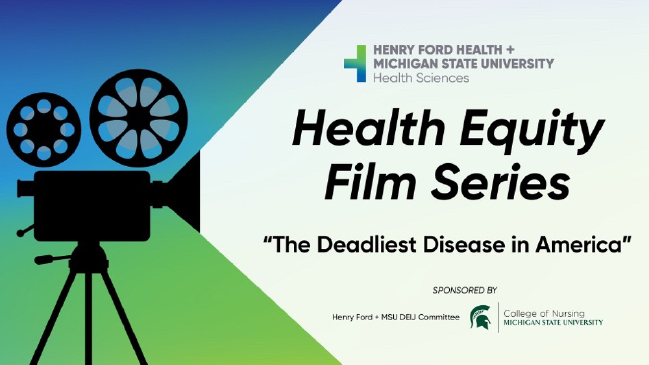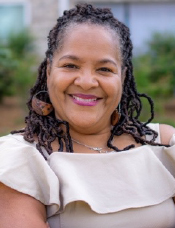Henry Ford + MSU Health Equity Film Series Featuring ‘The Deadliest Disease in America’

Wed., Feb. 28, 2024, at 5:30 p.m. at MSU and on Zoom
 View a film and join an enlightening discussion in the next Henry Ford + MSU Health Equity Film Series featuring “The Deadliest Disease in America.” This thought-provoking film, enhanced by expert-led discussions, highlights unequal treatment based on the skin color rampant in the healthcare machine.
View a film and join an enlightening discussion in the next Henry Ford + MSU Health Equity Film Series featuring “The Deadliest Disease in America.” This thought-provoking film, enhanced by expert-led discussions, highlights unequal treatment based on the skin color rampant in the healthcare machine.
Following the screening of the film, Renée Branch Canady, Ph.D., MPA, will moderate an engaging discussion on how bias and health inequity exist in modern-day healthcare. By the end of this event, participants will identify increased knowledge and state an example of historical factors and mitigation strategies that influence bias and health inequity in modern-day healthcare settings.
Canady is recognized as a national thought leader in the areas of health inequities and disparities, cultural competence, and social justice. She has published and presented broadly on these topics and her passion for this work is evident in her personal, academic, and professional life.
This event is free, and due to limited space registration is required. For in-person attendees, light refreshments will be provided.
Due to licensing, the film cannot be broadcast via ZOOM, however we invite you to a complimentary viewing of the film before or during the event on February 28. The film can be viewed here. This link will also be shared during the event while the in-person participants are viewing the film on the MSU campus.
MSU Campus Address
MSU Bott Building for Nursing Education & Research
Room C160 & C170
1355 Bogue St, East Lansing, MI 48824
Parking information will be shared in the reminder email to those who registered in-person
1.0-2.0 CNE/CME Contact Hours Available To Professionals
Learning Objectives
- Explore the historical factors that have shaped bias and disparities that exist within our healthcare system.
- Discuss health equity, access, and social determinants of health through an intersectional lens.
- Identify strategies to mitigate bias and address health equity and access in healthcare settings.
Number Of Credits And Criteria For Achieving Credits
To achieve 2.0 contact hours, participants must register, attest to viewing the film "The Deadliest Disease in America" (either in person or independently in advance), participate in the post-viewing guided discussion, and complete the post-session evaluation. Participants who are unable to view the film but register, participate in the post-viewing guided discussion, and complete the post-session evaluation will receive partial credit of 1.0 contact hour.
This activity also meets the Michigan Public Health Code General Rules content requirements for Implicit Bias licensure-training for healthcare providers.
Michigan State University College of Nursing is accredited with distinction as a provider of nursing continuing professional development by the American Nurses Credentialing Center’s Commission on Accreditation.
Michigan State University College of Osteopathic Medicine is accredited by the Accreditation Council for Continuing Medical Education (ACCME) to provide continuing medical education for physicians. MSUCOM designates this live activity for a maximum of 2.00 AMA PRA Category 1 Credit(s)TM. Physicians should claim only the credit commensurate with the extent of their participation in the activity.
For any questions related to CNE, please contact MSU Nursing Continuing Education at CON.Nurse.CE@msu.edu.
For any questions related to CME, please contact the College of Osteopathic Medicine CME office at cme@com.msu.edu.
More about 'The Deadliest Disease in America'
The Deadliest Disease in America, a documentary film produced and directed by Crystal R. Emery, (p.g.a) traces the history of racism in American healthcare, beginning with the brutal medical experimentation that slaves were forced to undergo. As this story unfolds over our nation’s history, the very same inequalities and biases continue to plague our healthcare system, creating disparities in the quality of care that Black and Brown people are afforded. Interwoven with the testimonies of experts and medical practitioners are the personal stories of patients who have been victimized by healthcare inequities, including the filmmaker’s own experiences as a quadriplegic African American woman. The COVID-19 pandemic is an exclamation point calling attention to these existing disparities, as we have witnessed communities of color experience disproportionately high rates of infection, staggering losses of life, and increased economic hardship. This film is not just about exposing the inequities in our healthcare system; it is also about re-establishing the humanity of Black and Brown Americans who have been rendered invisible, less valuable, and unworthy of their own lives. Throughout the film, voices from two public forums—consisting of doctors, nurses, activists, policy makers, and other community members—act as a “Greek chorus” to weave the pieces together, introducing issues and offering solutions. The film also highlights three organizations throughout the country that are making significant strides in resolving this crisis and models possibilities for civic engagement. The Deadliest Disease in America provides the rare opportunity to present a film that is directed and produced by a production team of color, bringing special sensitivity and honesty to the exploration of this issue that affects their lives.
More about the Moderator
Renée Branch Canady, Ph.D., MPA serves as Chief Executive Officer (CEO) of MPHI. Before joining MPHI in 2014, Canady served as the Health Officer and Director of Ingham County Health Department, located in Lansing, Michigan. Canady has also held faculty and administrative positions within the C.S. Mott Department of Public Health in the College of Human Medicine and the College of Nursing at Michigan State University, where she developed a research trajectory in health inequities. She continues to serve as an assistant professor chairing the core course “Health Equity for Public Health Practitioners.” Canady is recognized as a national thought leader in the areas of health inequities and disparities, cultural competence, and social justice. She has published and presented broadly on these topics and her passion for this work is evident in her personal, academic, and professional life. Canady has been an outstanding public health advocate, researcher, educator, and facilitator. She earned her Ph.D. in Medical Sociology from Michigan State University, a master’s degree in public administration from Western Michigan University, and a bachelor's degree in public health nutrition from the University of North Carolina at Chapel Hill.
About Henry Ford Health + Michigan State University Health Sciences
The product of a landmark, 30-year partnership introduced in January 2021, Henry Ford Health + Michigan State University Health Sciences is focused on setting a new standard for how individuals and communities experience care across the state of Michigan and the nation. The partners are addressing vital pillars of health outcomes: research, education, and care. As partners, Henry Ford Health and Michigan State University are creating a unified research community and investing in emerging cancer research and care; working to fight the health disparities that plague our most vulnerable communities in rural and urban settings; and preparing the next generation of physicians and nurses. To learn more about the Henry Ford Health + Michigan State University Health Sciences partnership, visit henryfordmsu.org.
Sponsored By:
Henry Ford + MSU DEIJ Committee
Michigan State University College of Nursing
